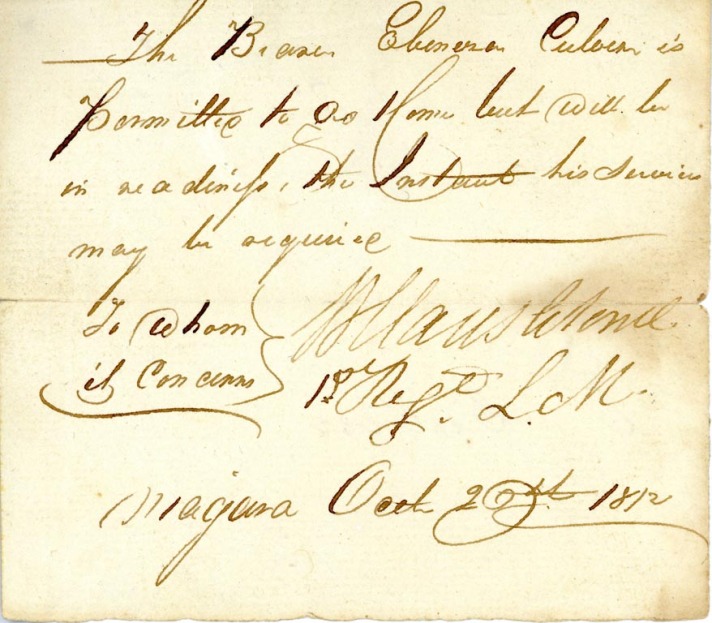
War of 1812 Leave Pass
During the summer and into the autumn of 1812, the small British garrisons at Fort George, Amherstburg, Fort York and other posts relied on Militiamen to augment their forces to defend against expected American attacks. Militia volunteers in the "flank companies" of regiments were expected to serve longer periods of active duty and were trained to fight alongside the well-trained British regulars. The regular or "sedentary" militia, comprised of all able men between the ages of 16 and 60, were given rudimentary training and were expected to be available for shorter periods of time, "called up" to work on road repairs, sentry duty, rowing bateaux, transporting supplies, and so on. They were also expected to fight if required but mostly within their own home areas. Militiamen had been involved in the capture of Michilimackinac in July and the capture of Detroit in August, 1812, and were a key factor in the British victory at the Battle of Queenston Heights on October 13, fighting alongside the British regulars and Indigenous allies.
One of the problems with the militiamen was that many of the men were also farmers, constantly worried about their farms when they were away on active service, particularly during the planting and the harvest times. At Fort George, many of the militiamen absented themselves without leave to travel home to do the haying or the harvest. Officially, they were considered deserters, a very serious crime in the British Army. However, almost all of the men returned to duty after finishing whatever they needed to do on their farms. Few thought this a serious transgression. The British did not take it so lightly, court-martialling and heavily fining those who had gone AWOL once they returned.
For the British, they needed a body of militiamen on which they could rely to be where they were expected to be at any given time. The rules on desertion were strictly enforced to ensure that however many militiamen were expected to be on duty were indeed present and accounted for. They also realized that these men had to return to their farms from time to time to ensure that their families had sufficient food and that agriculture did not generally suffer as a result of their military service. After all, the British garrisons relied on locally grown food along with the salt beef, salt pork, dried peas and barrels of flour shipped from England.
To control the situation, the British required militiamen on active duty to apply for leaves of absence, which would be granted when the situation permitted. To enforce the system, patrols of Regulars and Militia watched the roads and questioned men of military age, apprehending those suspected of being AWOL from active duty. This would have been rather trying, as few militiamen were provided with uniforms in 1812 and would have been indistinguishable from farmers and tradesmen not on active military duty, simply going about their business. In some cases, Indigenous allies were paid a bounty for bringing in deserters from the Regular Army and militiamen who had taken their leave without permission.
It was very much in a man's favour to apply for legitimate leave, something readily granted providing that there was no obvious threat looming in that theatre of war. Those with permission were given a passport to carry, a slip of paper signed by their regimental colonel, granting them leave but ensuring that they were prepared to be immediately called back from leave in the situation required. When the recipient of this pass was questioned while on his way home, the passport provided proof that he was legally away from his post and not a deserter.
This artifact is a rare example of such a passport, signed by Lieutenant-Colonel William Claus, Colonel of the 1st Regiment of Lincoln Militia. The date of the paper was two weeks after the Battle of Queenston Heights. No further trouble was expected that year and the British felt safe releasing a number of militiamen from active duty on the understanding that they would be called back if required.



